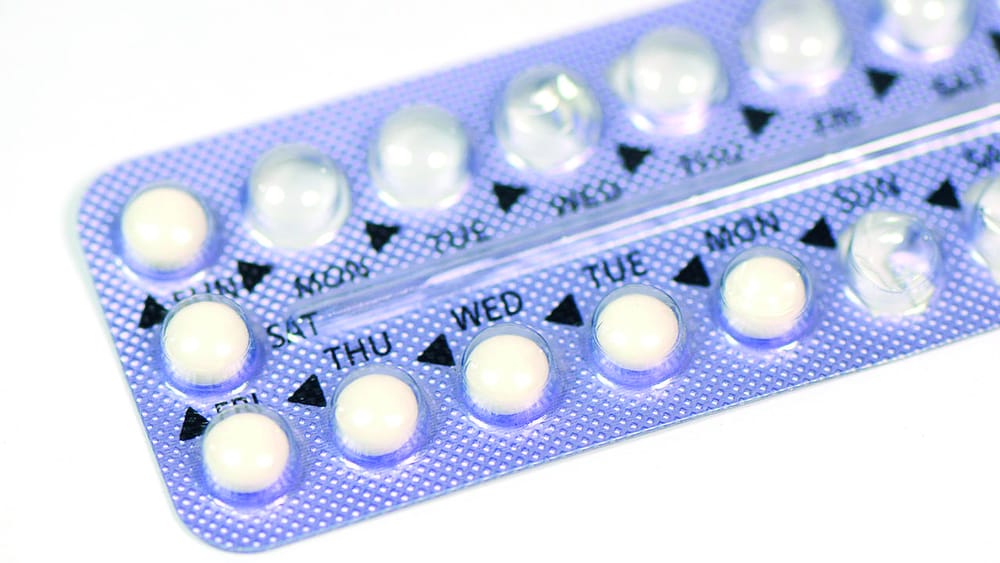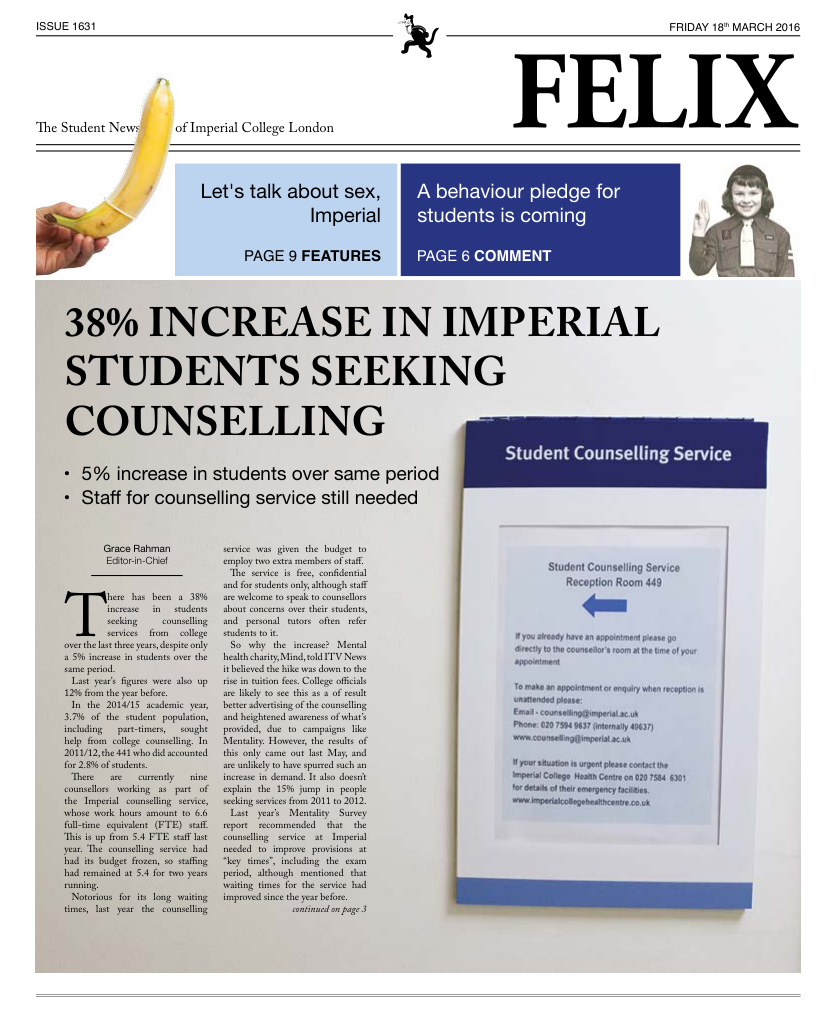We need to talk about contraception
Safe sex should be something to shout about

This article was published as part of Felix's Sex Survey launch.
In the UK, we’re lucky enough to have access to free contraception, regardless of who you are. The NHS provides 15 different methods, ranging from the provision of free condoms, to implanted devices, to sterilisation procedures, which have varying rates of effectiveness up to more than 99%.
As long as you’re making sure you’re being safe, there’s no right or wrong type of contraception, and which method suits you best will depend on your body and lifestyle. For some, taking the pill is a perfect solution, and for others, it’s just impossible to remember. It’s important to remember that contraception has two purposes – preventing pregnancy, and preventing STIs. With the nasties that are being passed around becoming increasingly antibiotic-resistant, it’s always better to be safe than sorry, use a condom, and get tested regularly.
Getting tested can be a daunting experience, particularly when you’re going there already feeling guilty for being a bit irresponsible. All those horror stories about umbrellas up your urethra are nothing but that – stories. Most STIs are very treatable, particularly if you catch them early – there’s no reason to be nervous. London has so many fantastic sexual health clinics (some of which specialise, if you want to talk about something specific) which are friendly, non-judgmental, and completely anonymous. By not getting tested regularly, you’re putting yourself and anyone you have sex with at risk, so make sure that you take the time to get it done.
As well as treatable STIs, there are some that become life-long conditions, such as HIV or hepatitis B. These days, there are post-exposure treatments to prevent infection, as well as methods of managing them long-term, should you be diagnosed. The NHS provides many widely available types of support, both in terms of treatment and emotional support. If you have been diagnosed, or feel that you may be at risk, seeking advice as soon as possible can really make the difference.
And if you do find yourself in the position of having an unplanned pregnancy, the NHS also offers support for all of your available options, whether or not that means ending the pregnancy. Either way, your GP or a GUM clinic can refer you to the right people, and again, it’s better to know sooner rather than later.
Sex is one of the most fun ways to pass the time between lectures, and I encourage all who want to do it, to do it as much as they like, as long as it’s safe and consensual. Have fun!
The trusty condom, or ‘Venus shirt’, as they say in Portugal
Condoms
The trusty condom, or ‘Venus shirt’, as they say in Portugal, is probably the most popular form of contraception. I’ve always found them to be a reliable friend. They’re cheap – often free (can stock up by the wheelbarrow-load from any good student union), easy, and effective – both in terms of not having babies (they’ve done me proud so far) and in avoiding nasty diseases, something not found so much in other contraceptive methods.
I know a lot of guys complain they don’t “feel as much” when using them, which I don’t think should be written off as just selfishness – it’s a legitimate gripe. But for convenience, effectiveness, and lack of side-effects, I don’t think you can go wrong with rubber.
The pill
The pill. A tiny, revolutionary, sugar-coated (literally) ball of pure lady hormone. Or maybe they’re synthetic (actually don’t tell me, if it’s grown in pigs like insulin as that’s definitely not halal and the premarital sex is bad enough). The concept is simple – you pop a pill everyday, or maybe 21 days out of every 28, and suddenly have full autonomy over your fertility, periods and life. Go you!
I’d recommend this to any womb-bearer who wants a fuss free way to stay baby-free, or anyone who’s about to go travelling and doesn’t want to get their period at a Full Moon Party. You might have heard horror stories – anything from changes of mood to getting a bit chubby, but your first dalliance into hormonal contraception is much like when Harry Potter first arrived at the wand shop on Diagon Alley. Some aren’t going to suit, and may well fuck shit up, but you can keep trying different brands (there are hundreds) until you find one that makes beautiful Patronuses.

The IUS
I took the mini-pill when I was younger, but the hormones didn’t gel well with the combination of my teenaged body and polycystic ovaries, and I ended up spending months soul searching over about why I was so depressed all of a sudden. Needless to say, that didn’t last long.
Wanting to avoid anything that would mess with my brain again, I used condoms for years, but eventually took the step towards five years of worry-free sex, and got the Mirena coil installed. Having it put in was a bit of a hassle (no one enjoys having their legs in stirrups in front of the doctor and assisting nurse), but it wasn’t particularly painful. Unfortunately, I did suffer an unusual reaction, causing me to go into shock, meaning it did take a week or so before I was full back to normal.
In the three years since, I’ve never had a period, had severe cramps, or had to worry at all about getting pregnant. And I still don’t need to think about it for another two years. Should everyone be getting a coil? I think yes.
The implant
The procedure for getting the implant seems unnecessarily sadistic: you have to pick the thing up yourself from a pharmacy, and the transparent packaging leaves you with no doubt as to how gigantic a needle is soon to be thrust into your arm.
Despite the intense dread after staring at the blade for about a week, I made it to my session, and the only thing I felt was the prick of the anaesthetic (and relief at my new immunity to babies). The implant works for me because I literally don’t have to do anything for 3 years (when on the pill I forgot it on more days than I remembered), and, apart from a weird month-long one to start with, it completely stopped my periods. A warning to the squeamish, though: I can totally see/feel it through my skin.
The IUD
There are a few things to consider about the IUD.
1: Getting one. This is annoying. You’ll need a cervical smear and to wait weeks for the results. Then you need to go in and get your cervix forcibly dilated and the IUD inserted. This is not at all fun. They tell you to take a painkiller. Do it. I then felt awful for the rest of the day.
2: Having one. So, my periods got heavier and more painful. I had to get prescription painkillers for this. Also, the strings can spike a guy’s boner – be warned.
3: Why bother? It lasts five years, it’s “always on”, has an amazingly low failure rate and doesn’t mess with your head even a bit. I can’t take the Pill and have a latex allergy, so it’s about all that’s left. At the same time... I don’t have to worry, at all, about pregnancy for five years. That’s pretty sweet!
The morning after pill
The morning after pill is intended to be an emergency solution rather than a planned contraceptive – but, for reasons best known to my 18-year-old self, one of the two occasions on which I used it was decidedly planned.
I didn’t get pregnant (yay) or get any of the possible side effects (like nausea or abnormal periods), but I did have to pay £22 to buy it online and walk all the way to Superdrug when it was raining.
The other time was actually a last resort and involved doing some Googling, going to a pharmacy that’d give it to me straight away and being briefly interrogated by a doctor before getting it for free. I’d probably buy one to keep around if I weren’t on other contraception now, just in case I couldn’t get to a pharmacy or just didn’t feel like talking to a doctor.









